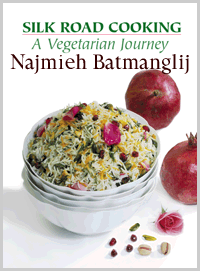
So could we
Virginity and the incredible pragmatism of the Iranian
woman
May 9, 2005
iranian.com
When I was a teenager I made a bet with my cousin that I would
lose my virginity before him. I remember we were sitting in our
garden in Tehran, under the walnut tree, by the swimming pool.
It was the seventies, I was around fourteen, and my cousin,
who was my best friend and confidant, was a year older. I had
not yet lived in the West but I did attend the American-style
Community School. My mother had attended the American missionary
school in Tehran and was one of the founding members of the Saazemaan-e-
Zanaan, a women’s organization, headed by the Shah’s
rather notoriously promiscuous sister, Ashraf Pahlavi.
We were wealthy and Westernized. Even though I was a Muslim
girl, only one or two generations removed from those who first
abandoned the Hejab, my desire to lose my virginity was not so
odd. It rose as much from my reading of my mother’s Harold
Robbins novels as my own teenage, tomboy-feminism. In our very
small circle of well to do, Western educated Iranians, a good
number of women, either influenced by the sexual revolution raging
in the West, or an elitist sense of license, were sexually active.
These pioneers did not consider the loss of virginity before marriage
as taboo.
Yet amongst my teenage peers I was a bit of a radical. I remember
arguing with both female and male friends about the unfairness
of expecting women to keep their virginity while encouraging men
to lose it. I developed my stance in a very matter of fact way:
if the guys could do it so could we. My belief in affording equal
opportunity to female desire predated my reading of feminist tracts--
before discovering de Beauvior and Friedan and Jong. It was the
kind of feminism that grew out of playground experience, out of
being able to kick the soccer ball as well as any boy.
 The Islamic Revolution brought
home to us the fact that we were not typical Iranian women. We,
of course, always knew this, but
now it was a source of shame. The Revolution, exposing the ‘cultural
imperialism’ that had given rise to our liberated views,
made us cringe. We distanced ourselves, feeling like we were not
quite Iranian. Those of us who were abroad and already thinking
in English began to feel more alienated from our roots than ever.
We tried to take the objective stance of anthropologists studying
another peoples’ culture. The Islamic Revolution brought
home to us the fact that we were not typical Iranian women. We,
of course, always knew this, but
now it was a source of shame. The Revolution, exposing the ‘cultural
imperialism’ that had given rise to our liberated views,
made us cringe. We distanced ourselves, feeling like we were not
quite Iranian. Those of us who were abroad and already thinking
in English began to feel more alienated from our roots than ever.
We tried to take the objective stance of anthropologists studying
another peoples’ culture.
We were interested in developments
in Iran but felt too different and removed to be able to judge
or participate in any real way. No one could deny the fact that
the majority of women willingly took on the Hejab, newly imposed
by the Islamic state. That simple fact, more than any ideological
battle or bullying techniques, made us retreat. Inside and outside
Iran women who believed in freedom of sexual expression were
either silenced and/or made to feel alienated from the majority.
It had been a long time since I had had to argue against the
need for virginity in not-yet-married women. Mostly because when
living abroad, none of the women I knew were virgins. In fact
at college, in Boston, the virgins were stigmatized. There was
a kind of reverse discrimination. Even the Iranian men I knew
considered it at best an inconvenience to sleep with or marry
a virgin. The only technically virgin friend that I had, in my
years of college, was a lesbian.
Of course I came to see that the blatant cooption of a male
sense of sexuality did not work either. Too many broken hearts,
too many one-night stands without an orgasm, confirmed the reality
of a difference in male/female sexuality that my teenage feminism
had not taken into account. Most of us soon understood the need
to forge a unique approach to female sexuality instead of a simple
mimicking of men. We evolved as women and feminists at a different
pace and in a different context than our Iranian sisters both
then and now.
Here, in Iran, there are more pressing needs. When
you have laws that glaringly declare you half a human being, like
the blood price for a woman being half that of a man’s,
freedom of sexual expression takes a back seat to the quest for
the simple recognition of your full humanity.
 I ran into the issue of virginity again, some thirty years later
when talking to women in Iran. From religious women and Hezbollahis
I always expect a Koran-based, conservative stance and treat it
with anthropological deference. But what shocked me was when I
met a self-proclaimed feminist and atheist, an admirer of De Beauvior,
who at the age of thirty-eight still holds fast to her virginity.
So I started asking around to get a feel for how women in Iran,
young and old, feel about the need for women to be virgins before
marriage. I ran into the issue of virginity again, some thirty years later
when talking to women in Iran. From religious women and Hezbollahis
I always expect a Koran-based, conservative stance and treat it
with anthropological deference. But what shocked me was when I
met a self-proclaimed feminist and atheist, an admirer of De Beauvior,
who at the age of thirty-eight still holds fast to her virginity.
So I started asking around to get a feel for how women in Iran,
young and old, feel about the need for women to be virgins before
marriage.
Even the types I least expected believed in it. Not out of any
religious conviction but out of a type of female pragmatism that
has bloomed here. Draconian laws, economic hardship and a state-sponsored
return to traditional mores, have given birth to a new kind of
female. Women here are modern, aggressive and ready to use their
chastity to attain a better life. They become engineers and doctors;
they get nose jobs and make themselves up like prostitutes, but
that hymen they never give up, unless it is for a marriage. It
is not a man they seek, but the institution of marriage itself,
which in many cases at once gives them legitimacy and license.
Legitimacy, because only as married women are they considered
successful regardless of other achievements. License, because
only with marriage can they leave the paternal nest. With a
fifty percent divorce rate many of these women become divorcees.
More
than a few women have told me that it is better to marry and
then divorce than it is not to marry at all. In fact divorced
women
enjoy much more freedom and a degree of promiscuity is expected
of them.
Much like Victorian England a whole underworld of drugs and
prostitution thrive just under the skin of society’s conservatism.
For ordinary women this underworld represents a much-feared hell.
Most of the women, I spoke to, believe that if they lose their
virginity they will lose suitors. The man, they make a forceful
argument, will not want to marry them afterwards and no one else
will either. Some engage in non-penetrative sex but only as away
to lure and keep the men interested. But they all look at their
virginity as dowry. There is even a little cottage industry for
surgically sewing back the hymen.
“But what about pleasure? Lezzat?” I ask
these women, and without exception they look at me like I am a
helpless
child needing direction. They either think that any thought of
pleasure is frivolous or that pleasure cannot be a priority under ‘these
conditions’. When I tell them how I view the matter they
stare at me and tell me, “You have been on the other side
(meaning the West) too long.” I tell them, “but I
thought this way when I was fourteen and living here.” They
then make the common refrain, “things are different now.”
 These women are too clever to be considered repressed victims
who need their consciousness raised. Keeping their virginity makes
them feel in control of their bodies, even if it is for trade.
They want a husband not only because without him they are stigmatized
by society, but also because it is the best way to find stability
and security (terms often used in these discussions). Their pragmatism
is their survival tool in the Islamic Republic. Take them out
of this context and they are sure to value their virginity less.
Theirs is an argument for efficacy and not one of conviction. These women are too clever to be considered repressed victims
who need their consciousness raised. Keeping their virginity makes
them feel in control of their bodies, even if it is for trade.
They want a husband not only because without him they are stigmatized
by society, but also because it is the best way to find stability
and security (terms often used in these discussions). Their pragmatism
is their survival tool in the Islamic Republic. Take them out
of this context and they are sure to value their virginity less.
Theirs is an argument for efficacy and not one of conviction.
|